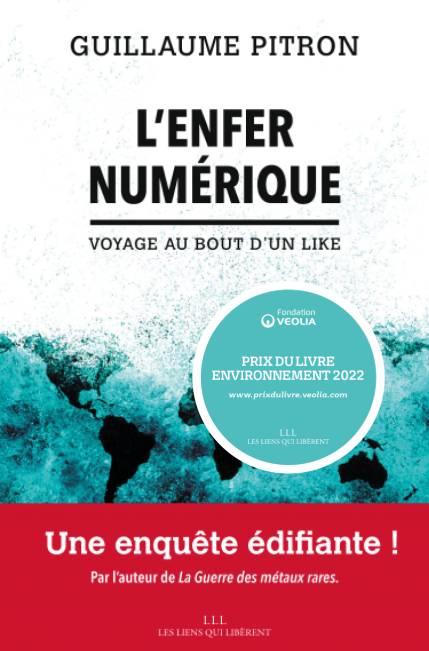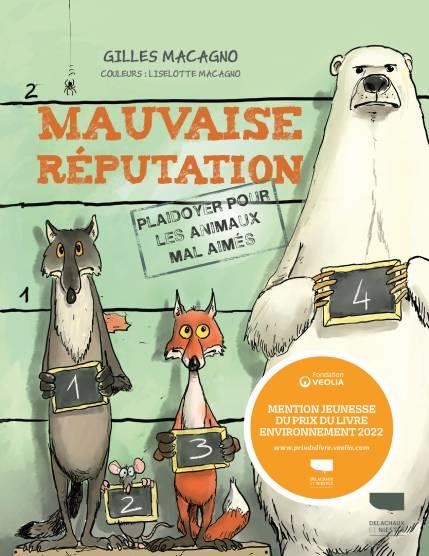At the Le Livre Sur La Place book fair in Nancy, France, the Veolia Foundation's Environmental Book Prize was awarded on 10 September to Guillaume Pitron for L'enfer numérique. Voyage au bout d'un Like ("Digital hell - following a 'like’ to the very end", published by Les Liens Qui Libèrent), and for the youth section, Gilles Macagno for Mauvaise réputation - Plaidoyer pour les animaux mal aimés ("Fighting a bad reputation - a plea for animals that are unloved", published by Delachaux & Niestlé). This 17th edition of the Prize honours the best works of the year that propose a new approach to the workings of our society and our economic model, advocating innovative solutions that will help create tomorrow's world.
The growing number of books nominated for the Environment Book Prize each year highlights not only the enormous interest in societal and environmental issues in the public debate today, but also the importance of publicising as widely as possible ideas and opinions concerning these vital issues. The president of the jury, Dominique Bourg, declared that "among the twenty or so books on the environment out of the nearly 200 published each year, we aim to select through this Prize a book that is not only a scholarly tome but one that adds to the general public's knowledge of the subject. "
The two winners in 2022
Adult Section:
L’enfer numérique. Voyage au bout d’un like, by Guillaume Pitron.
Published by Les Liens Qui Libèrent - September 2021 - 352 pages - €21
Guillaume Pitron, a journalist and film-maker, defends "a responsible digital economy that achieves a balance between its benefits and its negative manifestations". For two years, Guillaume Pitron travelled through a dozen countries to carry out a survey of the journey of a "like", which typically covers an average of some 10,000 miles.
"We are addicted to our mobile phones 24 hours a day, which is leading to the spreading of unnecessary infrastructure all around the globe. In 20 years' time, just to enable the Facebook metaverse to create a virtual double for each of the 7 billion humans on our planet, we will need to increase our computing power by a factor of 1,000 and further develop our existing infrastructure, including the 500 undersea cables currently stretching over 1.2 million km, as well as expanding the number of graphite mines, mainly located in China. For me, digital is a very useful tool, which must become responsible by achieving a balance between its benefits and its negative manifestations," explains the author.

Youth Section:
Mauvaise réputation - Plaidoyer pour les animaux mal aimés, by Gilles Macagno.
Published by Delachaux & Niestlé - March 2022 - 96 pages - €19.90
For Gilles Macagno, an illustrator and Professor of Earth Sciences in Brittany, "it is only by learning more about them that we will come to respect animals that are often unloved."
The author's starting point is to question the real purpose of all those pests and animals that we consider harmful, all those "dangerous vermin" that nevertheless have an important role in nature. It dispels the preconceptions about animals that have such a bad reputation among humans: wolves, foxes, bears, mosquitoes, spiders, scorpions and many more.
"In a humorous tone, this book explains, for example, that the fox and its reputation as a 'devourer of chickens' in fact feeds mainly on voles, thus fulfilling a very useful natural role. We humans should finally agree to leave nature a little more room to do its work. It is only by learning more about them that we will come to respect these unloved animals," concludes the author.


The impact of digital technology on the environment and society of tomorrow
During the prize-giving ceremony, a round table discussion on the theme of "the impact of digital technology on the environment and society of tomorrow" brought together three authors: Guillaume Pitron (L’enfer numérique. Voyage au bout d'un Like, Les Liens Qui Libèrent), Gérald Bronner (Les Lumières à l'ère du numérique, published by PUF), and Mirwais Ahmadzaï (Les tout-puissants, published by Séguier).
Gérald Bronner stated that on the social media, the availability of information is no longer regulated at all. It is no longer information that is valued, but rather the availability of each person's brain, which is hoped to capture through the use of algorithms. "We need to be very careful, because what leads straight to mistaken beliefs is lazy thinking. The more information we have available to us, the likelier we are to seek out facts that are closest to our own preferences. I therefore advocate that search engine results should be weighted in accordance with the representativeness of opinions in the public space. "
2022 prize-winner Guillaume Pitron showed that there are two opposing forces in digital technology: "infobesity", and the efficiency of technological advances that can result in real environmental gains. For example, while 5G consumes ten times less energy for the same amount of data, this new technology can thus increase our data output.
"So there is a paradox: the more efficient a technology is, the more people use it. On the other hand, if we doubled the lifespan of all our smartphones, we would greatly reduce pollution. In my opinion, to reconcile digital activity and the environment, the solutions will be collective," he concluded. collectives », a -t-il conclu.
The Environmental Book Prize
The first literary recognition of major environmental issues, this prize, created in 2006, aims to support, encourage and promote writers and publishers who contribute to raising public awareness of the major issues facing the planet. It is awarded by a jury of writers, environmental experts and personalities committed to sustainable development.
For more information
- The Veolia Foundation Environmental Book Prize
- “Le Livre Sur La Place" in Nancy (from 9 to 11 September 2022) is the first national literary fair to be held each autumn in France







